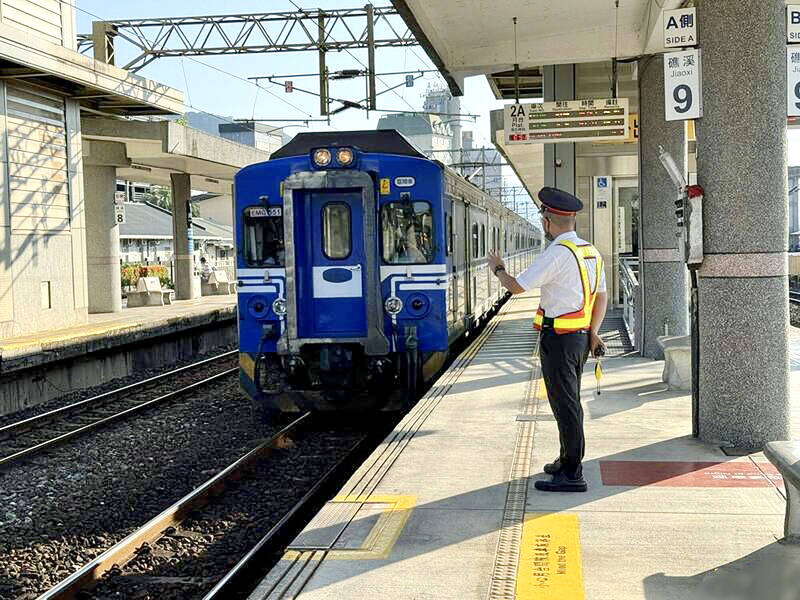Taiwan Railway Corp (TRC) is considering arming staff with body cameras and pepper spray, and allowing the forced removal of passengers who pose safety risks, following three assaults on conductors that occurred on Thursday.
There is general consensus within the organization that body cameras should be used, but opinions differ regarding the policies governing their use and management, company president Feng Hui-sheng (馮輝昇) said at a news conference in Taipei yesterday.
The devices would be introduced once a consensus is reached, he said.

Photo: Taipei Times
Responding to Thursday’s incidents, Feng said the company has “zero tolerance for violence” and would cover all legal expenses for the two injured staff members.
One of the conductors was slapped by a passenger on a northbound train in Hualien County who had been asked to get off the train for refusing to turn down the volume on his cellphone.
The other conductor was struck on the head and abdomen by a drunk passenger at Sanyi Station in Miaoli County.

Photo: Screen grab from the Facebook page “Kao Bei Taiwan Railway”
Both conductors received medical checks at local hospitals and had returned home by the time of the news conference, Feng said.
Later that evening, a separate incident occurred at Shulin (樹林) Station in New Taipei City, where a passenger boarded a TRC train carrying a box cutter before being apprehended by police.
Feng visited the affected employees and directed the company’s occupational safety department to provide follow-up care and support.
The company would work with the National Police Agency’s Railway Police Bureau and local police to increase police patrols and visibility on trains, Feng said, adding that passengers suspected of causing safety issues would be forcibly removed from the trains.
The company would also adopt a stricter approach to enforcing the law, he said, citing the incident in Hualien where police allowed a disruptive passenger to remain at the station without taking legal action, only for the passenger to later assault a conductor.
The Railway Police Bureau has also recommended that personnel be equipped with defense tools, such as pepper spray, Feng said.

Right-wing political scientist Laura Fernandez on Sunday won Costa Rica’s presidential election by a landslide, after promising to crack down on rising violence linked to the cocaine trade. Fernandez’s nearest rival, economist Alvaro Ramos, conceded defeat as results showed the ruling party far exceeding the threshold of 40 percent needed to avoid a runoff. With 94 percent of polling stations counted, the political heir of outgoing Costa Rican President Rodrigo Chaves had captured 48.3 percent of the vote compared with Ramos’ 33.4 percent, the Supreme Electoral Tribunal said. As soon as the first results were announced, members of Fernandez’s Sovereign People’s Party

MORE RESPONSIBILITY: Draftees would be expected to fight alongside professional soldiers, likely requiring the transformation of some training brigades into combat units The armed forces are to start incorporating new conscripts into combined arms brigades this year to enhance combat readiness, the Executive Yuan’s latest policy report said. The new policy would affect Taiwanese men entering the military for their compulsory service, which was extended to one year under reforms by then-president Tsai Ing-wen (蔡英文) in 2022. The conscripts would be trained to operate machine guns, uncrewed aerial vehicles, anti-tank guided missile launchers and Stinger air defense systems, the report said, adding that the basic training would be lengthened to eight weeks. After basic training, conscripts would be sorted into infantry battalions that would take

GROWING AMBITIONS: The scale and tempo of the operations show that the Strait has become the core theater for China to expand its security interests, the report said Chinese military aircraft incursions around Taiwan have surged nearly 15-fold over the past five years, according to a report released yesterday by the Democratic Progressive Party’s (DPP) Department of China Affairs. Sorties in the Taiwan Strait were previously irregular, totaling 380 in 2020, but have since evolved into routine operations, the report showed. “This demonstrates that the Taiwan Strait has become both the starting point and testing ground for Beijing’s expansionist ambitions,” it said. Driven by military expansionism, China is systematically pursuing actions aimed at altering the regional “status quo,” the department said, adding that Taiwan represents the most critical link in China’s

‘REALLY PROUD’: Nvidia would not be possible without Taiwan, Huang said, adding that TSMC would be increasing its capacity by 100 percent Nvidia Corp CEO Jensen Huang (黃仁勳) on Saturday praised and lightly cajoled his major Taiwanese suppliers to produce more to help power strong demand for artificial intelligence (AI), capping a visit to the country of his birth, where he has been mobbed by adoring fans at every step. Speaking at an impromptu press conference in the rain outside a Taipei restaurant, where he had hosted suppliers for a “trillion-dollar dinner,” named after the market capitalization of those firms attending, Huang said this would be another good year for business. “TSMC needs to work very hard this year because I need a lot